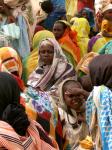
Written by Jim Wallis
Beyond all the important things that we are doing, there is one thing that we all must now do: stop the genocide in Darfur. For some time now, the world has known the facts of Darfur: up to 450,000 people dead and nearly 3 million displaced - black citizens (mostly Muslims) of the western region of Sudan are being daily attacked, raped, and massacred by marauding militias armed and supported by the country's Arab-dominated government in Khartoum. But knowing the facts hasn't changed them on the ground. Thousands more die each week of murder, hunger, and disease and the death toll could reach to the millions if the pillage of Darfur is not stopped soon.

In Washington, D.C., this weekend, and in 17 other cities, tens of thousands of people rallied to say "enough." It was the largest, clearest, and strongest public witness thus far against the horrible events that have been unfolding since 2003. The make-up of the crowd was the beginning of the answer to Darfur. Many commented on how this human crime and tragedy is bridging all our divisions, and bringing people together from across all our boundaries. Jewish families with their children gathered together with evangelical Christians, African-American church people with leaders from the Religious Right, Republicans with Democrats, Hollywood actors with conservative activists, and many students (for whom Darfur is becoming a rallying cry) with human rights advocates who see this as the paramount challenge of the moment. Speakers invoked the Holocaust, Cambodia, and Rwanda, repeatedly reminding us that we have often said "never again" only to let it happen again � and again. They told us that Darfur was the first genocide of the 21st century.
While the situation is complex, the crisis is rooted in longstanding grievances against African farmers who point to government neglect and ongoing conflict with primarily Arab herdsmen over land, water, and safety. That is why rebel groups are demanding formal representation in the Sudanese government to redress these grievances. The Sudanese government already has the land; it just wants to "cleanse" the land of its people. President Bush and Congress have named it genocide and the administration has tried to pressure the Sudanese government. But the world has been too slow and all the efforts thus far have failed to stop the daily death and atrocities. The Sudanese government has continued to resist international pressure. The U.S. has often been reluctant to put real teeth behind its rhetoric because of its strategic interest to keep the Sudanese government as an ally in the fight against terror.
 Nothing less than a strong multinational peacekeeping force is needed now to stop the raping and killing by the Janjaweed militias; to assure the delivery of critical food, medical, and humanitarian aid; and to provide the security necessary to make a political solution possible. The U.S. must push the U.N. Security Council to authorize a multinational peacekeeping force - over the objections of China and Russia who do business with Khartoum - to reinforce the existing African Union force. Additionally, the U.S. should push the UN to aggressively enforce the current sanctions against the Sudanese government. The Bush administration has called for many of the right things, but has not applied the necessary pressure to accomplish them. Only a massive outpouring of public opinion could change that and force the U.S. to do whatever it takes. As long as that does not happen, many more people will be savagely attacked and cruelly displaced.
Nothing less than a strong multinational peacekeeping force is needed now to stop the raping and killing by the Janjaweed militias; to assure the delivery of critical food, medical, and humanitarian aid; and to provide the security necessary to make a political solution possible. The U.S. must push the U.N. Security Council to authorize a multinational peacekeeping force - over the objections of China and Russia who do business with Khartoum - to reinforce the existing African Union force. Additionally, the U.S. should push the UN to aggressively enforce the current sanctions against the Sudanese government. The Bush administration has called for many of the right things, but has not applied the necessary pressure to accomplish them. Only a massive outpouring of public opinion could change that and force the U.S. to do whatever it takes. As long as that does not happen, many more people will be savagely attacked and cruelly displaced.
No comments:
Post a Comment